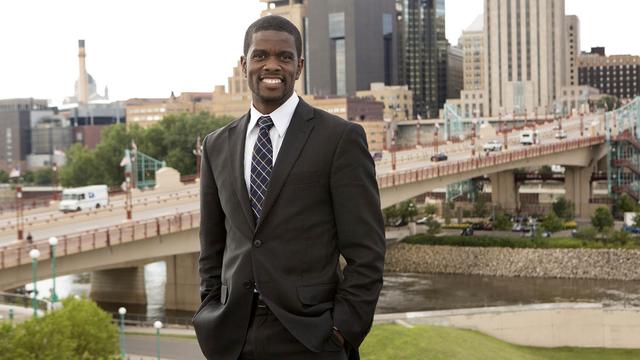By Kim Kiser
Talk to Melvin Carter III (’11 MPP) about St. Paul and you can feel his love for the city. It comes through in every word, every story.
As St. Paul’s first African American mayor, Carter has been building social capital in the capital city since taking office in January. He’s attended neighborhood meet-ups, supported students protesting gun violence, paid an impromptu visit to a Republican precinct caucus—all in the name of making the city a better place.
Carter recently talked about his plans and his time at the U’s Humphrey School of Public Affairs.
What were your career plans when you were in college?
I went to college at Florida A&M on a track and field scholarship. Honestly, my plan was to go to the Olympics. I didn’t know what I wanted to do with the rest of my life. But I figured that whatever you do, you need to have business skills. I saw myself in the corporate space or doing nonprofit leadership.
Why did that plan change?
Florida A&M is one of the largest historically black colleges in the country. We were there during Census 2000 having conversations about why it’s important for everyone to be counted. We were there when former Governor Jeb Bush flirted with dismantling affirmative action. We were there during a string of pipe bombings on campus. It was almost like a Civil Rights immersion experience.
In the midst of that came the 2000 election. My brother-in-law and hundreds of our classmates were turned away at the polls. All those experiences worked together to create a generation of people who are really passionate about doing something. I wasn’t going to sit on the sidelines.
Why come back and enroll in the Humphrey School?
I did an internship in the St. Paul department of planning and economic development during college. I had conversations with planners who would talk about how the design of a neighborhood impacts things like the quality of education children receive and the number of 911 calls. I got excited about that and needed the methodology to figure out how to approach those issues.
You received the Humphrey Alumni Scholarship during that time. How important was that?
As a young person with loans still left from undergrad, I don’t know if I would have been able to actually go to the Humphrey School without scholarship support.
Why run for City Council while finishing grad school?
I was working in Mayor Chris Coleman’s office when he first got elected. That’s when I really fell in love with municipal government. Municipal government touches our lives on such an intimate level—whether it’s sending a snow plow to make sure people can get to work or school, or getting a police officer to help people in their most challenging moments, or providing an after-school program for kids. I learned just how important good local government is. That made me want to run.
How did your Humphrey School experience prepare you for elected office?
There's no short answer to how my training at the Humphrey School has helped me prepare and operate as a public servant. In Dr. Sam Myers' policy and analysis class, he really homed in on identifying the problem that you’re trying to solve. We’d be off on these solutions and he’d say: What’s the problem? We’d spend the whole class talking about what the problem is, also understanding how people operate differently in groups than they do as individuals. Those specifics stick with me.
Beyond that the Humphrey School network is incredible. Both in Minnesota and Washington, DC. You can plug in with alumni who know you came from the Humphrey School, and it means something to them. There’s this incredible support network among Humphrey grads that I plug into every chance I get.
What about the U of M stays with you?
One thing I learned in Florida is what an incredible jewel the University of Minnesota is. I would be reading a case study and see that the research had been done at the University of Minnesota. The impact this university has on the country and the world is something.
Excerpted from Legacy. Read the entire piece at the U of M Foundation website.


